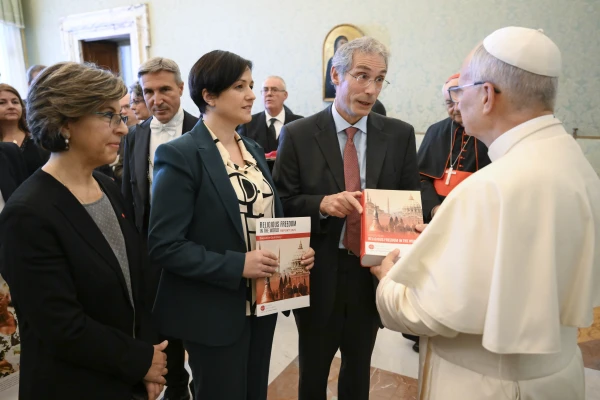Pope Leo XIV received the members of Aid to the Church in Need (ACN) at the Vatican on October 10, pontifical foundation that supports the Catholic Church in its evangelizing work in the most needy, discriminated and persecuted communities in the world.
In his initial greeting, the Holy Father highlighted the relevance of their work, especially in a world that continues to “witness growing hostility and violence against those who hold different convictions, including many Christians.”
Receive the main news from ACI Prensa by WhatsApp and Telegram
It is increasingly difficult to see Catholic news on social media. Subscribe to our free channels today:
It should be noted that Pope Leo XIV knows firsthand the mission of this foundation that supports many of the missions in Peru, including those of the Diocese of Chiclayo, where the Holy Father served as bishop.
According to the Pontiff, ACN’s mission – which finances more than 5,000 pastoral and humanitarian emergency projects in 137 countries – proclaims that, as one family in Christ, “we do not abandon our persecuted brothers and sisters.”

Pope Leo XIV also stressed that “the suffering of any member of the Body of Christ is shared by the entire Church.” Under this premise, he highlighted the “deep longing for truth, meaning and communion with others and with God” that every human being carries in his heart. A desire that, according to the Pontiff, “arises from the depths of our being.”
“The right to religious freedom is not optional, but essential”
ACN was born in 1947—as the Holy Father recalled—to defend religious freedom and as a response to the “immense suffering left after the war,” with the aim of promoting forgiveness and reconciliation.
The Pontiff firmly noted that “the right to religious freedom is not optional, but essential,” and referred to it as “a cornerstone of every just society, as it safeguards the moral space in which conscience can be formed and exercised.”
In this sense, he indicated that religious freedom “is not merely a legal right or a privilege granted by governments,” but “a fundamental condition that makes authentic reconciliation possible.”
Consequently, he clarified that, when this freedom is denied, “the human person is deprived of the ability to respond freely to the call of truth.” And he warned: “What follows is a slow disintegration of the ethical and spiritual bonds that sustain communities; trust gives way to fear, suspicion replaces dialogue and oppression breeds violence.”
“Do not get tired of doing good”
He then thanked the members of this foundation for their reports on Religious Freedom in the World, “a powerful instrument for raising awareness.”
“Wherever Aid to the Church in Need rebuilds a chapel, supports a nun, or provides a radio station or vehicle, they strengthen the life of the Church, as well as the spiritual and moral fabric of society,” he went on to say.
He also highlighted that his assistance helps “small and vulnerable minorities”, such as in the Central African Republic, Burkina Faso or Mozambique.
At the end of his speech, he thanked each one for this work of charity, because their service “bears fruit in countless lives and gives glory to our heavenly Father.” “Do not get tired of doing good,” he exhorted them.

